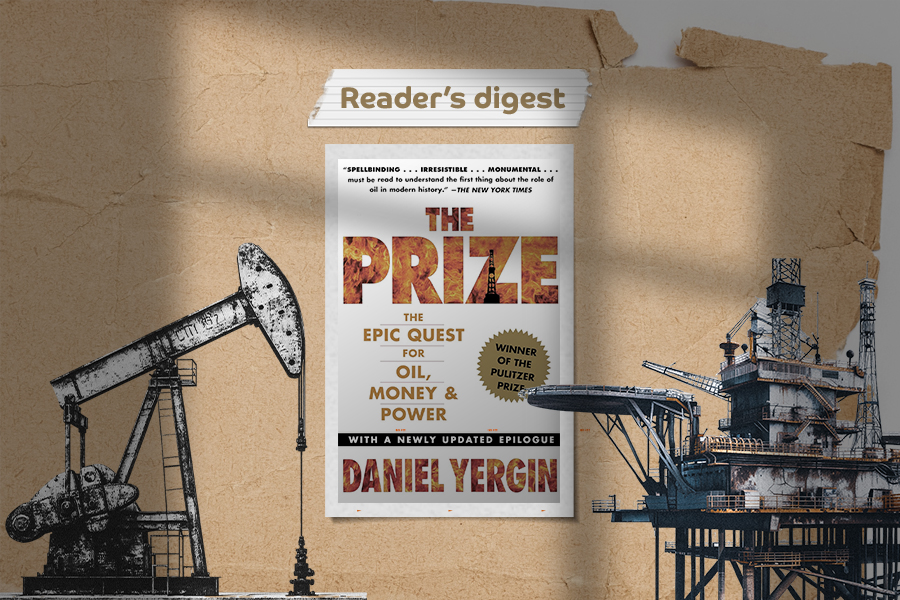The Prize: The Epic Quest for Oil, Money & Power, is not merely a book about oil. It is a sweeping historical narrative that spans over a century, tracing how this natural resource became the beating heart of the global economy, a driver of war, a diplomatic tool, and a constant source of conflict. Through dense, well-documented, and captivating storytelling, Daniel Yergin delivers a true epic of modern power centered around the story of black gold.
The Origins of the Oil Industry
Yergin begins his account in the 19th century with the birth of the oil industry in Pennsylvania. Initially, oil was used to produce kerosene for lighting. The central figure of this era is John D. Rockefeller, founder of Standard Oil, who managed to dominate the entire supply chain and establish a near-monopoly. Through him, Yergin illustrates how the concentration of resources can generate immense economic and political power.
The Era of Global Oil Empires
In the early 20th century, oil use shifted towards transportation, first for cars, then for warships drawing the attention of governments. Companies like Royal Dutch Shell and BP (British Petroleum) emerged as major players. Oil became a strategic asset; states seized control, and diplomacy followed suit.
Yergin shows how great powers, particularly Britain, the United States, and later the USSR reshaped the political map of the Middle East based on their oil interests. The infamous "oil diplomacy" was born, with deals like the Red Line Agreement and the founding of ARAMCO in Saudi Arabia.
World War II and Oil as a Weapon
During World War II, oil became a decisive factor. Mechanized armies had a vital need for fuel. The Allies won in part due to their secure access to oil, while Nazi Germany and Japan suffered from severe shortages.
Postwar Period, Rise of Nationalism, and OPEC
Between the 1950s and 1970s, oil-producing countries, especially in the Global South and the Middle East, began to demand greater control over their resources. This led to the creation of OPEC (Organization of the Petroleum Exporting Countries). In 1973, during the oil crisis, Arab nations imposed an embargo against the West, causing a price surge and demonstrating the producers’ leverage over the global economy.
The Contemporary Era (Up to the Gulf War)
The book also covers the 1980s, marked by wars (Iran-Iraq), energy crises, falling oil prices, and the emergence of new actors, particularly in extraction technologies. It concludes with the Gulf War (1990–1991), a moment when oil once again became central to geopolitical strategies. Yergin shows how the U.S., protector of Saudi Arabia, views oil as a matter of vital national security.
A Monumental, Almost Encyclopedic Work
Yergin succeeds in encapsulating a century of world history in a single book. His strength lies in connecting economics, geopolitics, war, and technology, demonstrating how oil consistently lies behind major global events. Backed by extensive documentation, his storytelling is lively, filled with anecdotes, portraits of leaders (kings, presidents, CEOs), and behind-the-scenes diplomatic accounts.
Objectivity and Nuance
The author avoids ideological simplification. He neither glorifies nor demonizes oil multinationals. He reveals the contradictions of all players: commercial interests, state strategies, nationalist movements, emerging environmental concerns… It's a multidimensional analysis where every decision is set in its geopolitical and economic context.
Oil’s Role in Global Power Dynamics
A key lesson from the book is that oil has redefined the concept of international power. It has shifted military priorities, shaped diplomatic alliances, and altered economic structures. Great powers can no longer be understood independently of their energy security.
Limitations of the Book
However, some critics fault Yergin for adopting a heavily Western-centric view. The perspectives of Global South oil-producing countries are sometimes underdeveloped or viewed through the lens of Western companies or governments. Also, while the book mentions the environmental impact of the oil industry, this remains a secondary topic (partly due to the book’s original publication date in 1990).
Why This Book Remains Relevant Today
Though The Prize ends in the early 1990s, it offers key insights into today’s tensions: disputes in the South China Sea, the war in Ukraine, Middle East conflicts, and efforts toward energy transition. All these dynamics are still linked to oil through its use, scarcity, or the desire to move beyond it.
The book also provides perspective on the ongoing energy transition. It reminds us that energy transitions are never smooth; they come with struggles and have major implications for the global balance of power.
An Essential Classic for Understanding the Modern World
The Prize by Daniel Yergin is much more than a history of oil. It’s a key to understanding the 20th century and the rise of the contemporary world. It reveals how behind every major decision, war, or treaty, there often lies a quest for control over energy, especially oil.
In a world facing climate disruption, geopolitical shifts, and energy crises, understanding oil’s history is understanding the roots of modern power. This book stands as a classic indispensable for history enthusiasts, as well as students of international relations, economics, and geopolitics.
Please post your comments on:
[email protected]
 Politics
Politics








